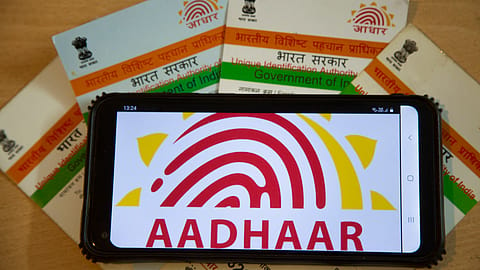Centre calls Moody's concerns on Aadhaar 'baseless'
Moody's says India's Aadhaar faces hurdles, including the burden of establishing authorisation and concerns about biometric reliability.

The government has called the concerns raised by Moody's Investors Service on Aadhaar, the world's largest digital identity programme, 'baseless'.
On Saturday, Moody's said that India's Aadhaar system faces hurdles, including the burden of establishing authorisation and concerns about biometric reliability. The system often results in service denials, and the reliability of biometric technologies, especially for manual labourers in hot, humid climates, is questionable, the rating agency said.
Rebutting the allegations, the Ministry of Electronics and Information Technology says Moody's does not cite either primary or secondary data or research in support of the 'opinions' presented in its report. "The investor service did not make any attempt to ascertain facts regarding the issues raised by it from the Authority. The sole reference cited in the report is in respect of the Unique Identification Authority of India (UIDAI), by referring to its website," the government says, adding that the report incorrectly cites the number of Aadhaar cards issued as 1.2 billion, although the website prominently gives the updated numbers.
Moody's claims that use of biometric technologies results in service denials for manual labourers in India's hot, humid climate, an obvious reference to India's Mahatma Gandhi National Rural Employment Guarantee Scheme (MGNREGS). "It is evident that the authors of the report are unaware that the seeding of Aadhaar in the MGNREGS database has been done without requiring the worker to authenticate using their biometrics, and that even payment to workers under the scheme is made by directly crediting money in their account and does not require the worker to authenticate using their biometrics," the government says.
The report also ignores that biometric submission is also possible through contactless means like face authentication and iris authentication, the Centre says, adding that the option of mobile OTP is also available in many use cases.
Recommended Stories
Moody's in its report says that the centralised Aadhaar system has drawn scrutiny, especially concerning privacy and security. Reacting to these allegations, the government says that factual position in this regard has been repeatedly disclosed in response to Parliament questions, where Parliament has been categorically informed that till date no breach has been reported from Aadhaar database. "Parliament has laid down robust privacy protections in the law governing the Aadhaar system and these are observed through robust technological and organisational arrangements," the Centre says.
"A certain investor service has, without citing any evidence or basis, made sweeping assertions against Aadhaar, the most trusted digital ID in the world. Over the last decade, over a billion Indians have expressed their trust in Aadhaar by using it to authenticate themselves over 100 billion times. To ignore such an unprecedented vote of confidence in an identity system is to imply that the users do not understand what is in their own interest," the government says.
(INR CR)
A number of international agencies, including the IMF and World Bank, have lauded the role of Aadhaar, the government highlights. Several nations have also been engaged with the Authority to understand how they may deploy similar digital ID systems, it adds. Recently, the G20 Global Partnership for Financial Inclusion (GPFI), in a report prepared by the World Bank, stated that the implementation of digital public infrastructure (DPI) such as Aadhaar, along with the Jan Dhan bank accounts, and mobile phones, is considered to have played a critical role in moving ownership of transaction accounts from approximately one-fourth of adults in 2008 to over 80% now—a journey that it is estimated could have taken up to 47 years without DPIs.